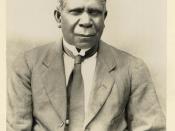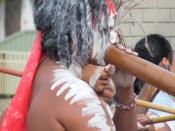Power is a force that provides an individual or a group the ability to control. The term 'powerplay' refers to the manipulation of power between people and can be seen in the doc After Mabo and Cop it Sweet, both text explore race relationships and the power discrepancy between white Australian and indigenous people. Although in the form of a doc to add credibility, both texts are in fact biased.
John Hugh's 'After Mabo' focuses on the manipulation of power in politics emphasising the greed and fickleness of the politicians. Shown through Howard's quote 'if the High Court brings down a decision I will accept', this is opposed to his later words 'govt can make decisions'. This use of contradiction portrays him as a hypocrite and exposes the manipulation of power through verbal exertion. The Indigenous representatives must prove not only their cultural heritage but also their position as community leaders.
In order to fight for justice, they have to follow the Western laws in the houses of parliament--buildings that are designed to maximize the sense of power and the authority of the government. The design of the Parliament House, with the Indigenous heritage outside and European inside, emphasizes the power positions within the negotiations. The conflict hungry media support the government by creating hype and falsehoods surrounding land issues. Shown through their highly emotive terms like 'target', 'Mabo Style' misleading the public into thinking the indigenous are taking over the land, this allows politicians to act arbitrarily as the public are frightened and unable to judge rationally. The creation of fear present the Aborigines as the 'imaginary enemy', swinging the public to the powerful National Farmer's Federation, who pose themselves as the victim and uses propaganda such as 'Who'll feed Australia now'. The composer portrays the farmers' federation...


